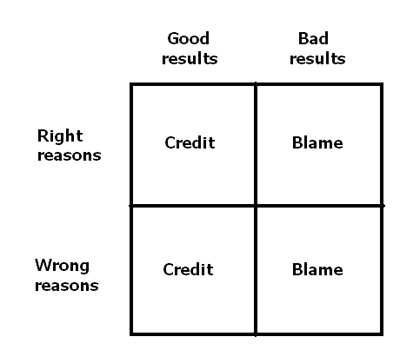Right For The Wrong Reasons
Funny things happen when human nature collides with reality. In the vast archive of comical situations, none are more curious than our responses to failure.
When failure happens, few care how it happened: the blame goes to the decision maker. The logic is that the results define everything. In turn, when things go well, regardless of how or why, credit goes in the same direction. Even if the thinking was poor and success was complete luck, or something pulled together by others in spite of the bad decision.

The logical flaw is that sometimes we make the right decision for the wrong reasons. And by the same token, sometimes we do all the right things and the results are bad, because of luck or factors beyond our control. There are always more variables in the outcome than the surface decisions that are made.
Someone who’s made recent mistakes may in fact be a much better decision maker than someone who’s had recent successes. They might be taking on bigger challenges. They might have stronger competiton or fewer resources than others. Without examining how their logic (and situation) matched to the results, it’s difficult to know how much credit they deserve.
Taken to the psychopathic extreme: we sometimes excuse our own failures by blaming circumstance (“But I did everything I could”), but fail to give those around us the same generosity (“I don’t care why it happened: it’s your fault.”). This kind of inconsistency is poison: it’s impossible to to build trust when people are rewarded for making excuses and patted on the back for pointing fingers.
If you’re a leader, and you do this yourself you’re setting an evil tone for others to follow. (When was the last time you distributed credit you didn’t deserve? Or took blame away from those who did not deserve it?) If you’re able to raise the bar on how people deal with these situations, they’ll spend more time working and waste less time stealing credit and dodging blame.

Great post Scott!
So how would you go about promoting people with bad results?
Well, if I’m the boss, that’s easy. I wave my magic boss wand and he’s promoted. Seriously, if I can make a sound argument as to why someone performed well even though the project failed, promotion (or at least some kind of praise and earned respect) is entirely possible.
For example: I’ve seen people volunteer to take on projects that are clearly train wrecks in progress. They worked hard and turned some things around, but the end result was still a failure. I can see lots of ways to argue for them performing well, despite failing.
However, I’m not saying you should seek out people that fail and promote them. That’s absurd. The point to the post was that we’re inconsistent in how we judge who deserves credit & blame.
Another angle on this is learning. We learn best through failure (for lots of reasons I won’t go into unless you ask). Someone who just cost the company $20k, but learned some important lessons that no one else could have learned, might be more valuable in the long run that someone who succeeded but did not learn those things.
Simply great! Thanks for sharing! :-)
“we sometimes excuse our own failures by blaming circumstance .. but fail to give those around us the same generosity”
See also the fundamental attribution error.
There are times it works quite the opposite too: people with low self esteem tend to blame themselves instead of circumstance, for example.